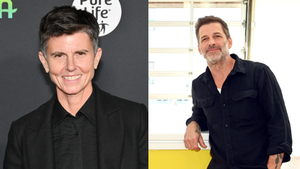Treatment GuideJust DiagnosedSex & DatingAfrican AmericanStigmaAsk the HIV DocPrEP En EspañolNewsVoicesPrint IssueVideoOut 100
CONTACTCAREER OPPORTUNITIESADVERTISE WITH USPRIVACY POLICYPRIVACY PREFERENCESTERMS OF USELEGAL NOTICE
© 2025 Pride Publishing Inc.
All Rights reserved
All Rights reserved
By continuing to use our site, you agree to our Privacy Policy and Terms of Use.
Don't tell Phill Wilson that African-Americans are the 'new' face of the pandemic. The founder and executive director of the Black AIDS Institute says African-Americans, black women in particular, have been hit disproportionately hard from the very beginning of the AIDS crisis. 'We found out as early as 1984 that African-Americans accounted for 25% of AIDS cases and that black women, for example, at that time represented over 50% of the AIDS patients among women,' Wilson says. 'While clearly the disproportionate nature has grown, from the very beginning the face of AIDS has been a multicultural face.' Wilson'who turns 50 this year and marks the bittersweet point of spending half of his life with HIV, just as the nation marks the 25th year since the first AIDS cases were diagnosed'worked in the HIV arena from the 1980s until health problems forced him to quit in 1996. But successful triple-drug therapy had the crusader feeling robust enough by 1999 to rejoin the fight. 'When I looked to see where the greatest need was, it was clear that the place I could best serve was focusing on AIDS's impact on African-Americans,' he says. He responded by founding the Black AIDS Institute, which he describes as the 'only AIDS think tank in the country focusing on black people.' 'Our mission,' he says, 'is to stop the epidemic in black communities by engaging and mobilizing traditional black institutions, leaders, and individuals. We do this in three ways: through capacity building, training, and technical assistance; information dissemination; and advocacy from an unapologetically black point of view.' The institute also continues to battle beliefs that HIV is a 'white gay disease,' an assumption that makes it too easy to ignore its rapid spread among African-Americans. 'If we are to stop the AIDS epidemic, we have to raise the HIV-science literacy in black America,' he insists. 'When people understand the science, they are better able to protect themselves, better able to adhere to medicines if they are HIV-positive, better able to advocate for access to treatment and care, and in a better position to influence public policy around HIV. I think it's getting better, but we still have a long way to go.'
From our Sponsors
Most Popular
“So much life to live”: Eric Nieves on thriving with HIV
September 03 2025 11:37 AM
Thanks to U=U, HIV-positive people can live long, happy, healthy lives
July 25 2025 2:37 PM
The Talk: Beyond the exam room
August 13 2025 3:15 PM
BREAKING: Supreme Court rules to save free access to preventive care, including PrEP
June 27 2025 10:32 AM
Messenger RNA could be the key to an HIV vaccine — but government cuts pose a threat
August 20 2025 8:02 AM
“I felt like a butterfly”: Niko Flowers on reclaiming life with HIV
July 23 2025 12:22 PM
Dancer. Healer. Survivor. DéShaun Armbrister is all of the above
July 02 2025 8:23 PM
The Talk: Starting the conversation
July 25 2025 4:47 PM
The lab coat just got queer
August 21 2025 10:00 AM
Plus: Featured Video
Latest Stories
HIV-positive men stage 'Kiss-In' protest at U.S.-Mexico border
December 01 2025 12:56 PM
What the AIDS crisis stole from Black gay men
December 01 2025 6:00 AM
Amazing People of 2025: Javier Muñoz
October 17 2025 7:35 PM
It’s National PrEP Day! Learn the latest about HIV prevention
October 10 2025 9:00 AM
“I am the steward of my ship”: John Gibson rewrites his HIV narrative
September 16 2025 2:56 PM
The Talk: Owning your voice
August 25 2025 8:16 PM
The Talk: Navigating your treatment
August 01 2025 6:02 PM
How the Black AIDS Institute continues to fill in the gaps
July 25 2025 1:06 PM
1985: the year the AIDS crisis finally broke through the silence
June 26 2025 11:24 AM
VIDEO: A man living with HIV discusses his journey to fatherhood
June 10 2025 4:58 PM
Trump admin guts $258 million in funding for HIV vaccine research
June 03 2025 3:47 PM
Grindr is reminding us why jockstraps are so sexy and iconic
May 02 2025 5:36 PM
HRC holds 'die-in' to protest Trump health care cuts
April 28 2025 2:11 PM
Two right-wing Supreme Court justices signal they may uphold access to PrEP and more
April 21 2025 4:10 PM
500,000 Children at Risk: PEPFAR Funding Crisis
April 08 2025 3:51 PM
Broadway's best raise over $1 million for LGBTQ+ and HIV causes
April 03 2025 7:15 PM
The Talk Season 5 premieres this spring with HIV guidance for the newly diagnosed
March 26 2025 1:00 PM
Trending stories
Recommended Stories for You









































































